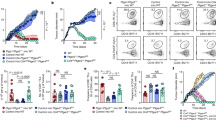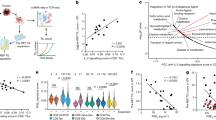Abstract
CD40/CD40 ligand (CD40L) interaction plays an essential role in cell-mediated immune responses. We examined whether expression of CD40L in murine lung carcinoma (A11) cells could produce antitumor effects. The proliferation rate in vitro of A11 cells transfected with the murine CD40L gene (A11/CD40L) was not different from that of parent cells; however, half of the immunocompetent mice inoculated with A11/CD40L cells did not form tumors and the growth of A11/CD40L tumors developed in the rest of mice was significantly retarded compared with that of parent tumors. Protective immunity was also induced in the mice that had rejected A11/CD40L cells. In T-cell-defective nude mice, these antitumor effects were not observed. Bone-marrow-derived dendritic cells (DCs), when cultured with A11/CD40L cells, formed clusters with the tumors and showed upregulated CD86 expression. Expression of the interleukin-23 (IL-23) p19, IL-12p35, IL-18, interferon-γ (IFN-γ) and Mig (monokine induced by IFN-γ) genes was induced in the DCs that were cultured with A11/CD40L but not with A11 cells, and P40, the subunit of both IL-12 and IL-23, was secreted from the cocultured DCs. These data directly showed that the expression of CD40L in tumors facilitated the interaction between DCs and the tumors, enhanced the maturation of DCs, induced secretion of cytokines, and consequently produced T-cell-dependent systemic immunity.
This is a preview of subscription content, access via your institution
Access options
Subscribe to this journal
Receive 12 print issues and online access
$259.00 per year
only $21.58 per issue
Buy this article
- Purchase on Springer Link
- Instant access to full article PDF
Prices may be subject to local taxes which are calculated during checkout




Similar content being viewed by others
References
Cella M, Scheidegger D, Palmer-Lehmann K, et al. Ligation of CD40 on dendritic cells triggers production of high levels of interleukin-12 and enhances T cell stimulatory capacity: T-T help via APC activation. J Exp Med. 1996;184:747–752.
Peng X, Kasran A, Warmerdam PA, et al. Accessory signaling by CD40 for T cell activation: induction of Th1 and Th2 cytokines and synergy with interleukin-12 for interferon-γ production. Eur J Immunol. 1996;26:1621–1627.
Yang Y, Wilson JM . CD40 ligand-dependent T cell activation: requirement of B7-CD28 signaling through CD40. Science. 1996;273:1862–1864.
Grewal IS, Flavell RA . The role of CD40 ligand in costimulation and T-cell activation. Immunol Rev. 1996;153:85–106.
Mackey MF, Gunn JR, Ting PP, et al. Protective immunity induced by tumor vaccines requires interaction between CD40 and its ligand, CD154. Cancer Res. 1997;57:2569–2574.
Kikuchi T, Crystal RG . Anti-tumor immunity induced by in vivo adenovirus vector-mediated expression of CD40 ligand in tumor cells. Hum Gene Ther. 1999;10:1375–1387.
Noguchi M, Imaizumi K, Kawabe T, et al. Induction of antitumor immunity by transduction of CD40 ligand gene and interferon-γ gene into lung cancer. Cancer Gene Ther. 2001;8:421–429.
Wierda WG, Cantwell MJ, Woods SJ, et al. CD40-ligand (CD154) gene therapy for chronic lymphocytic leukemia. Blood. 2000;96:2917–2924.
Kikuchi T, Moore MAS, Crystal RG . Dendritic cells modified to express CD40 ligand elicit therapeutic immunity against preexisting murine tumors. Blood. 2000;96:91–99.
Liu Y, Zhang X, Zhang W, et al. Adenovirus-mediated CD40 ligand gene-engineered dendritic cells elicit enhanced CD8+ cytotoxic T-cell activation and antitumor immunity. Cancer Gene Ther. 2002;9:202–208.
Korst RJ, Mahtabifard A, Yamada R, Crystal RG . Effect of adenovirus gene transfer vectors on the immunologic functions of mouse dendritic cells. Mol Ther. 2002;5:307–315.
Oppmann B, Lesley R, Blom B, et al. Novel p19 protein engages IL-12p40 to form a cytokine, IL-23, with biological activities similar as well as distinct from IL-12. Immunity. 2000;13:715–725.
Takasu M, Tada Y, Wang JO, Tagawa M, Takenaga K . Resistance to apoptosis induced by microenvironmental stresses is correlated with metastatic potential in Lewis lung carcinoma. Clin Exp Metastasis. 1999;17:409–416.
Tada Y, O-Wang J, Takiguchi Y, et al. A novel role for Fas ligand in facilitating antigen acquisition by dendritic cells. J Immunol. 2002;169:2241–2245.
Rescigno M, Piguet V, Valzasina B, et al. Fas engagement induces the maturation of dendritic cells (DCs), the release of interleukin (IL)-1β, and the production of interferon γ in the absence of IL-12 during DC-T cell cognate interaction: a new role for Fas ligand in inflammatory responses. J Exp Med. 2000;192:1661–1668.
Gardella S, Andrei C, Costigliolo S, et al. Interleukin-18 synthesis and secretion by dendritic cells are modulated by interaction with antigen-specific T cells. J Leukoc Biol. 1999;66:237–241.
Stober D, Schirmbeck R, Reimann J . IL-12/IL-18-dependent IFN-γ release by murine dendritic cells. J Immunol. 2001;167:957–965.
Morelli AE, Zahorchak AF, Larregina AT, et al. Cytokine production by mouse myeloid dendritic cells in relation to differentiation and terminal maturation induced by lipopolysaccharide or CD40 ligation. Blood. 2001;98:1512–1523.
Padovan E, Spagnoli GC, Ferrantini M, Heberer M . IFN-α2a induces IP-10/CXCL10 and MIG/CXCL9 production in monocyte-derived dendritic cells and enhances their capacity to attract and stimulate CD8+ effector T cells. J Leukoc Biol. 2002;71:669–676.
Wong P, Severns CW, Guyer NB, Wright TM . A unique palindromic element mediates gamma interferon induction of mig gene expression. Mol Cell Biol. 1994;14:914–922.
Kuniyoshi JS, Kuniyoshi CJ, Lim AM, et al. Dendritic cell secretion of IL-15 is induced by recombinant huCD40LT and augments the stimulation of antigen-specific cytolytic T cells. Cell Immunol. 1999;193:48–58.
Parrish-Novak J, Dillon SR, Nelson A, et al. Interleukin 21 and its receptor are involved in NK cell expansion and regulation of lymphocyte function. Nature. 2000;408:57–63.
Kasaian MT, Whitters MJ, Carter LL, et al. IL-21 limits NK cell responses and promotes antigen-specific T cell activation: a mediator of the transition from innate to adaptive immunity. Immunity. 2002;16:559–569.
Batrla R, Linnebacher M, Rudy W, et al. CD40-expressing carcinoma cells induce down-regulation of CD40 ligand (CD154) and impair T-cell functions. Cancer Res. 2002;62:2052–2057.
Acknowledgements
This work was supported by a grant-in-aid for scientific research from the Japan Society for the Promotion of Science (JSPS). L Yu and Y-Q Wang were supported by the JSPS postdoctoral fellowship.
Author information
Authors and Affiliations
Corresponding author
Rights and permissions
About this article
Cite this article
Tada, Y., O-Wang, J., Yu, L. et al. T-cell-dependent antitumor effects produced by CD40 ligand expressed on mouse lung carcinoma cells are linked with the maturation of dendritic cells and secretion of a variety of cytokines. Cancer Gene Ther 10, 451–456 (2003). https://doi.org/10.1038/sj.cgt.7700584
Received:
Published:
Issue Date:
DOI: https://doi.org/10.1038/sj.cgt.7700584
Keywords
This article is cited by
-
Virology- and immunology-based gene therapy for cancer
Cancer Immunology, Immunotherapy (2006)



